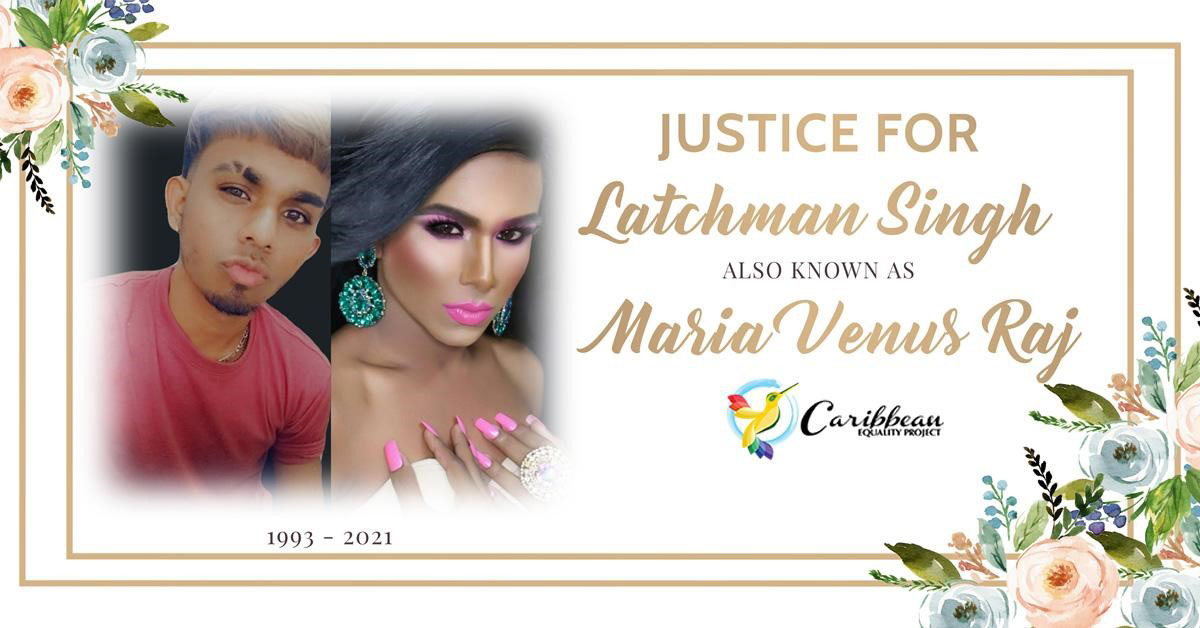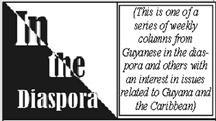By Ryan Persadie and Mohamed Q. Amin (Caribbean Equality Project)
Ryan Persadie is artist, educator, and PhD candidate at the University of Toronto. He also works and organizes as board member and cultural researcher at the Caribbean Equality Project.
Mohamed Q. Amin is the founder and executive director of the Caribbean Equality Project where he works as a Queer & Muslim Human and Immigrant Rights activist. A native of Guyana, he currently resides in Richmond, NY. To learn more about the Caribbean Equality Project, connect on YouTube, Facebook, and Instagram at @CaribbeanEqualityProject and on Twitter @CaribEquality.
On April 13, 2021, artist Latchman Singh, otherwise known as Anthony, Marc Anthony, and Maria Venus Raj was murdered in El Dorado, Trinidad and Tobago. A migrant from Guyana, Singh left his hometown seven years ago in pursuit of better economic opportunities and for LGBTQI+ community and support. He was nationally, regionally, and internationally recognized as a formidable makeup artist, fashion designer, pageant runway coach, and drag performer. Described as joyful, humble, inspirational, and brilliant by friends and family, Singh’s death comes as a devastating reminder of the horrific ongoing consequences of homophobia and sexual violence that continue to plague the landscape of the Caribbean and its diasporas.
Learning the devastating news of his death, many artists, friends, family, and community organizations took to social media to offer condolences. Each person paid their respects to the immense talent, spirit, and commitment to the arts, beauty industry, and queer performance that Anthony offered. Reflections from organizations such as Pride Trinidad and Tobago, the Trinidad and Tobago Transgender Coalition,and CAISO Sex and Gender Justice; and media outlets including the Trinidad Express, and Guyana’s Stabroek News, among others, dominated many different social media platforms with video testimonies and picture memorials proliferating throughout global digital space.
Here at the Caribbean Equality Project, we were equally devastated. Anthony/Maria, was a common collaborator and a friend of our organization. In 2020, Maria participated in a digital drag showcase “A Night of Caribbean Drag,” produced by Sundari The Indian Goddess and Laila Gulabi, which was a celebration of the artistry and talents of Caribbean drag artists from the U.S., Canada, and Trinidad and Tobago. This artist showcase was a benefit for the Caribbean Equality Project’s COVID-19 Emergency Relief Fund, which supports undocumented Caribbean LGBTQ+ immigrants and asylum seekers impacted by the coronavirus in New York City. To date, because of unapologetically queer Indo and Afro-Caribbean drag-centric activists like Maria Venus Raj, the Caribbean Equality Project has distributed over USD$40,000 to 200+ Black and Brown queer and trans Caribbean immigrants. During the peak of the global COVID-19 pandemic, Maria also participated in an interview with fellow drag artist Ryan Persadie/Tifa Wine for an online newspaper feature on Caribbean drag artists around the world, which was published in the New York City-based Gay City News.
Since Anthony/Maria’s murder, the Caribbean Equality Project has assisted with transporting Anthony’s body back to Guyana and providing his family with relief. With the support of community and more than 65 international donors, we accomplished this goal and posthumously realized Anthony’s dream of one day returning home. On Thursday, April 29, Anthony’s funeral was held in Guyana, where family and friends performed his final rites and said goodbye.
To memorialize the kindness, generosity, and utter ferocity that Anthony/Maria carried within him, we (Ryan Persadie and Mohamed Q. Amin) began curating a tribute program so that all those who were in relation to him could come together and celebrate his life. We began working to develop a digital tribute space on Zoom where friends, family, and colleagues could submit photographic memorials, video testimonials/messages, and pre-recorded video tributes honoring his love and passion for drag culture.
On Monday evening, May 3, more than three hundred participants from Trinidad and Tobago, Guyana, Barbados, St. Vincent, the US, Canada, and the UK joined together to mourn, grieve, and celebrate Anthony/Maria. During the virtual memorial, we witnessed deep acts of caring and love from those who were impacted by Anthony/Maria, and their fearlessness, artistry, and aesthetic, spanning countries and continents. Joining in at this virtual memorial were Anthony’s mother Bibi Kassim and his sister Trisha Singh, and his friends Ravi Latchman, Clinton Findlay, Chandradatt Jagdeo, Marcus Kissoon, Mariana Jade Walcott, along with Caribbean regional partners including Pride TT and Xoë Sazzle of the Transgender Coalition of Trinidad and Tobago.
While Anthony’s sudden and unjust passing is shocking, it regrettably comes as another quantifiable addition to the numbers upon numbers of queer, and trans of color community members who consistently fall victim to acts of harm, injury, and death, often without justice and accountability. Let us remember Raymond Choo Kong, Kwesi Mona, Gregory Singh, Roger Jackson, and Keon Patterson (otherwise known as Sasha Fierce) who also met similar fates in recent years.
As of now, neither Anthony’s family nor us has any information from the murder investigation surrounding the circumstances leading to his death. We are reminded that in the Caribbean, we are still caught in times of (neo-)colonial power, in which racial, sexual, and gender difference continue to mark the graves of those who should still be here. It has been three weeks since the Anthony’s murder and according to his sister, the authorities in Trinidad have failed to provide the family with any information or updates on their investigation; we understand the police are yet to identify a suspect.
We need to continue to support organizations, activists, and transgressive agitators who pursue the ongoing work of liberation for all marginalized communities, including the advocacy and outcry for justice for Anthony Singh. We need to work towards combatting the unimaginable numbers of cold cases of queer and trans death that go unresolved, where we must continue repeating over and over again the names of lives cut much too short. We need to continue combating widely circulated ideas in the Caribbean and its diasporas, that our Caribbeaness is incompatible with gender and sexual difference or that there is no room for queerness in Caribbean spaces. Caribbean landscapes have always been queer, and let us not forget that Anthony’s death is just another reminder of how, despite the age in which we live, many of us are still not free. To many, the “non-normativity” of queerness still holds much weight to pursue the erasure of non-heteronormative life in all of its forms.
Finally, we leave you with the words of Anthony Singh and Maria Venus Raj as, just some months ago in an interview we did with them, she commented on the state of racial-sexual politics in Trinidad and Tobago and her role in political work as a drag artist with us:
“I have always believed in the saying, “let the beauty of what you love be what you do.” My passion for art is something that was always growing. I became so intrigued about one of the most exquisite expressions of art – drag. My inspiration comes directly from Bollywood actresses and movies. The colors, the fabrics used, the delicate moves, the heavy use of accessories for adornment that enhances one’s beauty. I also love how the colors in Bollywood movies are comparable to the vibrancy of the Caribbean and our melting pot of culture.
Growing up in a very homophobic community, I was always scared to experience new things because of how shallow-minded people were and how bad they treated people who are a part of the LGBT[QI+] community. The moment I started to commit myself and fully accepted who I am, my life took a complete turn. I lost a lot of friends and family, but I was proud of the independent person I became. Drag for me then gave me validation, where I always kept looking for a spark that made me a complete person.
Here in Trinidad, it’s sad that LGBTQ[I+] rights aren’t given any attention or visibility. It’s still characterized as taboo. Two years later, after having the buggery law targeted, I don’t believe there was any major progress to ensure the safety of the community. Hate, ridicule, and discrimination are still prevalent in society.
Being able to liberate myself and live my life freely, I am happy that I was able to motivate and inspire a lot of young gay men to live their true self. When I’m on stage, performing, doing a photoshoot in my full illusion, there is nothing but joy, confidence, and happiness that exudes around and in me. Unfortunately, it’s something I can’t do full-time in Trinidad solely because of the negative view of the public and the consequences that come along with it. I would only wish that the public can be more sensitive and accepting for us all to have an equal community.”
To find out more about the Caribbean Equality Project, visit https://www.caribbeanequalityproject.org/ or email us at info@caribbeanequalityproject.org


